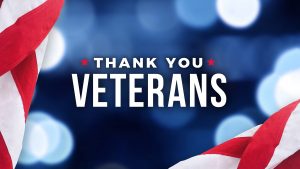
The story of Veterans Day began on November 11, 1919, when President Woodrow Wilson signed a proclamation commemorating the armistice that, one year earlier, had ended the fighting between the Allied nations and Germany in World War I. In recognition of that historic truce — which occurred on the 11th hour of the 11th day of the 11th month of 1918 — Wilson declared that the anniversary would be known as Armistice Day. “To us in America, the reflections of Armistice Day will be filled with solemn pride in the heroism of those who died in the country’s service and with gratitude for the victory,” he proclaimed.
Congress passed a resolution for an annual observance in 1926, and Armistice Day became a national holiday in 1938. In 1954, in the aftermath of World War II and the Korean War, President Dwight D. Eisenhower signed legislation officially changing the name of Armistice Day to Veterans Day to honor American veterans of all wars. Today, as the U.S. Department of Veterans Affairs (VA) notes, “Veterans Day is largely intended to thank living veterans for their service, to acknowledge that their contributions to our national security are appreciated, and to underscore the fact that all those who served — not only those who died — have sacrificed and done their duty.”
Only about 6% of the general U.S. population has served in the military, but among police officers that number is a whopping 19%, according to an analysis of U.S. Census data performed by Gregory B. Lewis and Rahul Pathak of Georgia State University for The Marshall Project. In fact, the profession represents the third most common occupation for veterans. This is likely because many veterans possess the same traits needed to succeed in a law enforcement career, including discipline, teamwork and a desire to serve.
While veterans bring numerous transferable skills to the profession, they may also bring a unique set of experiences — some of which, tragically, have been traumatic. According to the VA, varying degrees of post-traumatic stress disorder (PTSD) are common among veterans who have seen combat. For example, in a given year, about 11 to 20% of veterans who served in operations Iraqi Freedom and Enduring Freedom suffer from PTSD. If left untreated, PTSD can lead to depression, anxiety and, worst of all, suicide. The VA’s 2019 National Veteran Suicide Prevention Report revealed that there were 6,139 veteran suicide deaths in 2017, an increase of 129 from 2016, and confirmed that the rate of suicide among veterans continues to be higher than the rest of the population.
These statistics are staggering, especially from a law enforcement perspective, because peace officers are already at an increased risk for PTSD and suicide due to the intense traumatic stress they experience in the course of their work — in fact, research indicates that members of the profession are now more likely to die by suicide than in the line of duty. That’s why it’s so important for lawmakers, agencies and civic leaders to take steps to address mental and emotional health issues within the profession and acknowledge that these are injuries suffered in the line of duty that should be covered by workers’ compensation programs.
“Too often, our culture’s recognition of veterans is limited to a single day of posting a patriotic image on social media, offering them a discounted restaurant meal, waving a flag or watching a parade — but we should be thanking them for their service each and every day,” LAAPOA President Marshall McClain says. “That means not just paying lip service, but recognizing the challenges they face and ensuring that they have access to the resources, services and ongoing support they need. And that goes double for our brothers and sisters in blue who are veterans and willingly signed up to continue putting their lives and safety on the line in the service of their communities.
“This year, we have faced unprecedented stress, strain and risk due to the global pandemic, civil unrest, rising crime, an anti-police narrative pushed by the media and politicians, demoralizing calls to defund or even abolish our profession, and other knee-jerk attacks on law enforcement,” McClain continues. “With everything that’s happening, it can feel like everyone is against us and no one cares. I want our law enforcement brethren who are veterans, and all veterans, to know that we see you and we support you, today and every day. From the bottom of our hearts, thank you for your service, your dedication to duty, and all the sacrifices you have made and continue to make in the service and protection of others.”
